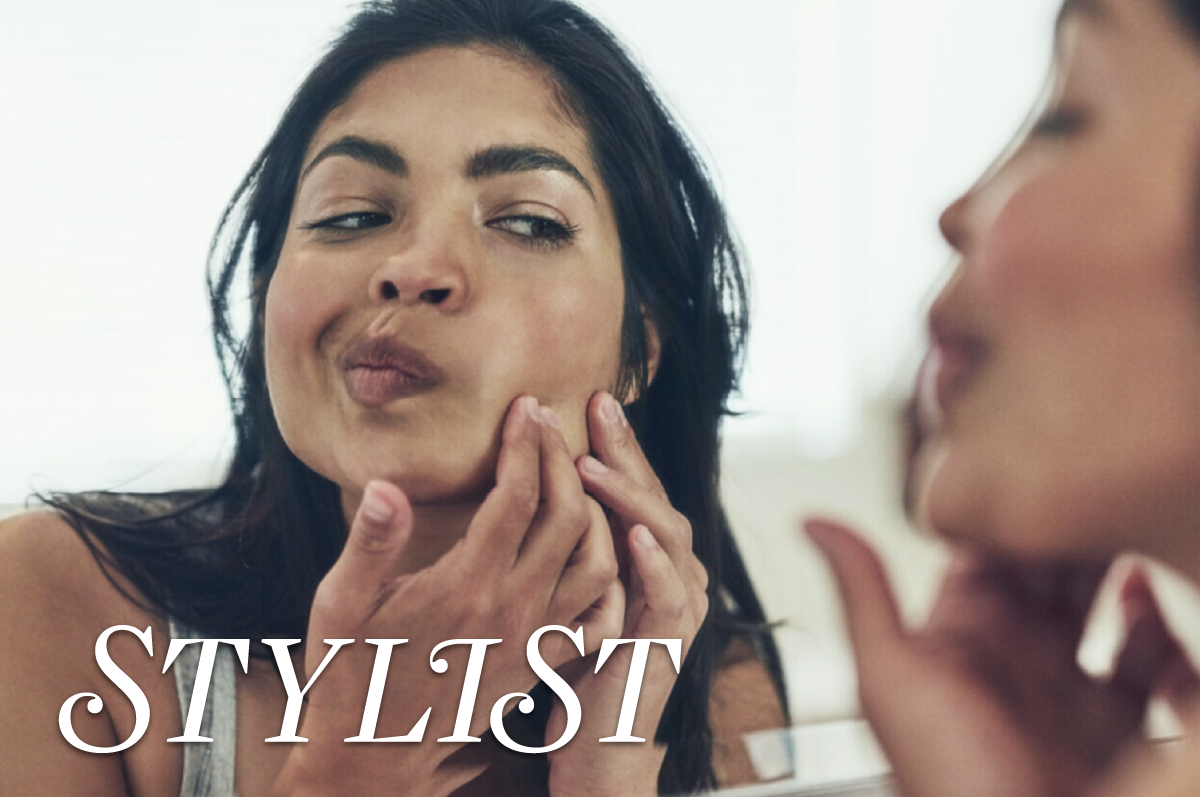Why you can’t stop picking your spots (even if you want to), according to a psychologist

If you secretly enjoy popping whiteheads or spending your evenings in front of a mirror using a blackhead removal tool, you’re not alone. For many of us, picking our own spots – or watching videos of others having theirs popped, plucked and squeezed – has become a guilty pleasure. So why, when we know picking our skin is bad for us, do we continue to do it? We asked a psychologist to shed some light on this secret phenomenon.
Picture the scene: you’re getting fried after a quick shower when you catch a glimpse of yourself in the bathroom mirror. You take one step closer, running your hands through your hair, when you notice a slightly large pore on your chin. Before you know it, you’ve stepped even closer, craning your neck to get a better look at the glass and squeezing the area surrounding the mark. What starts as an innocent act of observation slowly but inevitably descends into a mission to extract, pick or remove every single blemish, mark or bump on your face. Before you know it, you’ve been at it for 15 minutes. You know it’s bad for you, but you just can’t stop.
If this all sounds incredibly familiar, don’t worry. Whether you enjoy picking your own spots, spend time convincing your partner to let you squeeze theirs or watching Dr Pimple Popper videos for hours on end, many of us find solace in a good extraction – especially when the problem is right there in front of us. However, we also know that picking spots isn’t good for us. Dermatologists have long warned against at-home extractions, and anyone who has done it will know it only tends to make the spot more red, inflamed and likely to scar. But still we struggle to resist the urge to sit down with a magnifying mirror and get up close and personal.
Why is this? Dr Gisele Caseiras, a psychodynamic psychotherapist and co-founder of Likeminds London, believes it’s down to a multitude of factors – the first of which is simply how satisfying the release of pus, blood or oil from a spot can be. It’s the same reason why other satisfying experiences – like eating junk food, drinking alcohol or smoking a cigarette – can be so addictive: dopamine.
“From a chemical perspective, spot-popping can lead to the release of dopamine – the neurotransmitter associated with pleasure and rewards,” Dr Caseiras says. “The fact that the satisfaction is almost instant – and there’s barely any work involved – makes it a really easy way for us to seek out that release.”
While dopamine isn’t necessarily a bad thing – from an evolutionary perspective, it’s designed to reward us for behaviours that are necessary for our survival like eating, drinking, reproducing and competing – over time, the dopamine rush we get from popping a spot reinforces a link between the two which drives us to seek it out again.
Similarly, Dr Caseiras believes stress could also be a driving cause of spot-popping – in particular, the ability it has to relieve stress. According to research from the work technology brand Ciphr, one in four (24%) UK adults feel stressed for more days of the month than they don’t, with one in nine (11%) feeling stressed every single day, so it’s no surprise that we’re all hungry for ways to keep our stress levels under control. And Dr Caseiras believes that skin picking, while seemingly unrelated to the overflowing inboxes and household responsibilities driving our stress, can provide us with an outlet to shake off some of that pressure.
Why? “Because sometimes it’s easier to manage something that’s physical and right in front of you,” Dr Caseiras says. “Skin picking or blackhead removal can provide you with a sense of control – you can see the problem and deal with it right away. And over time, that can become a pattern because you begin to associate skin picking with a way to distract yourself from your worries and gain control.”
On top of all of this, the pressure society places on all of us to have clear, blemish-free skin – which, even if you don’t think you’re bothered, probably lingers somewhere in your subconscious – can also make us feel like we’re taking action, Dr Caseiras adds.
“It’s completely normal to have spots, marks and blemishes, but when people perceive them as imperfections, ‘getting rid’ of them can bring a sense of gratification because it feels like you’re removing something negative,” she explains.
In this way, while we know that picking our spots probably isn’t going to give us clear skin, the illusion of removing things from our faces makes us feel like we’re making some kind of progress towards the ‘goal’ we see represented by societal beauty standards. While trends such as glass skin or glazed donut skin might come and go, one of the most prevailing skin-based beauty standards is a clear complexion. Look on the shelves of any supermarket and you’ll see a wide array of products promising to clarify, soothe and blur breakout-prone skin. And while the rise in popularity of pimple patches and spot stickers has helped us start to move on from the idea that spots need to be hidden and concealed, there’s still a lot of pressure to at least strive for a breakout-free face.
Of course, it’s important to note that popping a few spots or blackheads is not the same as dermatillomania – a mental health condition that causes a compulsive need to pick at the skin. While stress and anxiety can be a trigger for both types of skin picking, the difference between the two is that dermatillomania is compulsive – meaning people with the condition struggle to stop themselves from picking no matter how much willpower or intention they put into it, often leading to injury and scarring as a result.
How To Stop Popping Your Spots
We get it – spot-popping and blackhead removal can be incredibly satisfying, but there’s good reason why the experts recommend against it.
“Spots occur when our pores are blocked with things like dead skin cells or excess oil and bacteria, and popping a spot puts you at risk of causing damage to the skin barrier and increases your risk of infection,” explains Dr Leah Totton, a skin doctor and cosmetic specialist. “Acne spots often form in a deeper layer of the skin, so popping these can put you at an even higher risk of scarring or infection.”
But as we all know, stopping a behaviour like spot-popping is easier said than done – so what do the experts recommend? We asked Dr Caseiras to share her top psychological tips and tricks for getting on top of this bad habit.
Recognise Your Triggers
The key to stopping any bad habit is to recognise what’s driving it. For spot-popping, that could be a multitude of factors, but the best place to start is recognising when you get the urge to pick and sitting with that urge for a second.
“Think to yourself, ‘Am I bored? Am I stressed out? Am I experiencing negative emotions?’” Dr Caseiras suggests. “Identifying what’s driving your habit will allow you to put coping strategies in place which get to the root of the issue.”
Create Substitute Behaviours
This will depend on your triggers, but you should find a way to replace your spot-popping with more beneficial behaviours.
For example, if you notice you pick your skin when you’re stressed, having a toolbox of strategies on hand will help you to feel calm.
“If you’re trying to rid yourself of imperfections, replacing your skin picking with a form of skincare – eg using a nice cream or slathering yourself with moisturiser – can not only make it more difficult for you to pick (your skin will be slippery), but also help you to take care of your skin instead of hurting it,” Dr Caseiras says.
Getting rid of items which enable your bad behaviour – such as a magnifying mirror that allows you to see all your spots and bumps up close – can also help.
Challenge Your Perspective
This is especially poignant if your skin-picking comes from a place of insecurity or self-loathing, Dr Caseiras explains.
“It’s important to challenge any negative thoughts and see if you can replace them with something positive,” she says. “Why not explore the idea that it’s OK to have blemishes, and remind yourself that having the odd spot or mark is totally normal? Just because we don’t see them in pictures, doesn’t mean that’s a standard you need to live up to. There’s value in reminding yourself of that.”
How healthy is your relationship? The simple ways to find out
The key signs of a healthy relationship… Attraction and intimacy While it...
12 things you should never say to your partner
Did you know that telling someone to ‘calm down’ during an argument might...
Coping with a sudden death
When a loved one or celebrity dies, it can trigger feelings of shock,...
“As the ‘forgotten friend’, I’m often a better friend to others than they are to me, and it’s lonely”
Are you there for everyone else but rarely prioritised in return? Here’s...
Don’t feel scared at thought of an ‘empty nest’ this September if you’re a solo parent – try to treat this seasonal time of transition as an opportunity to rediscover ‘you’
Whether you co-parent with your ex-partner or are bringing up your child...
Adolescent Mental Health
This article was published on Dr. Sophia Khalique Medical Practice's blog...
Benefits of group & individual therapy
As seen in the Simon, a 42-year-old graphic designer, recently undertook...
Why do I binge-eat and how can I face my guilt?
As seen in A few months ago I was tidying up after my youngest son’s...
Would you like to join our mailing list?
From time to time we may notify you of new blogs on the website, or share thoughtful, relevant articles and content, aimed at informing and helping people.
© 2020 Likeminds Psychotherapy and Coaching - London | Glossary | Privacy Policy | Site by Diagonal








